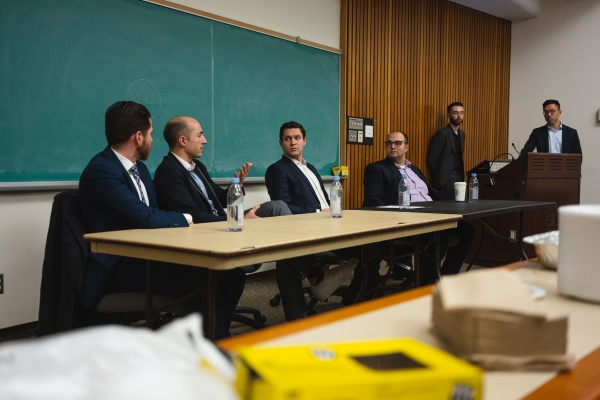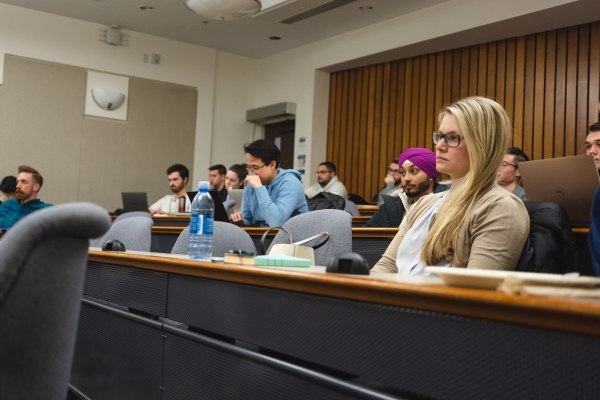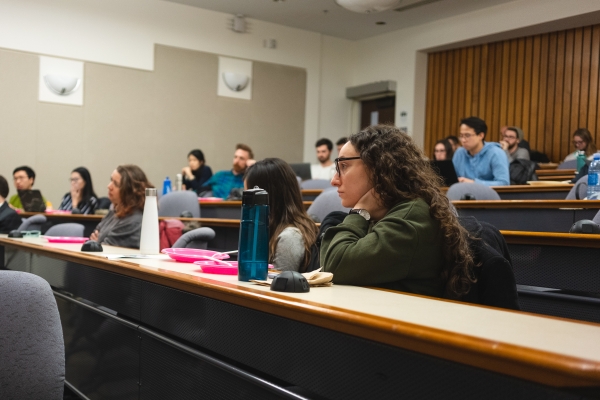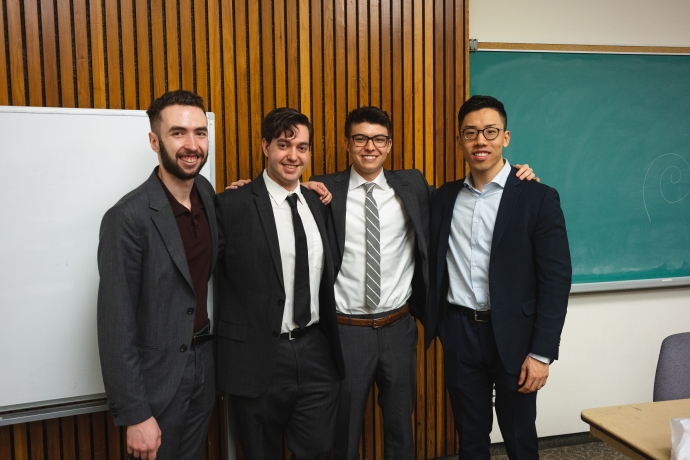Story by Zachary Lechner-Sung / Photos by Ilya Motamedi
“Cannabis law is like learning to drive a car on a road that is still being paved, as the car is being assembled,” said Mark Cavdar, director of legal affairs at Aphria Inc. He was one of the speakers at the inaugural panel of the Cannabis Law Club, founded by students Ben Barrett, Ernest Tam, Zach Lechner-Sung and Benjamin Persofsky.
Intro to Cannabis Law, held March 7, 2019, heard from lawyers from Aphria Inc., Canopy Growth Corporation, Cassels Brock & Blackwell LLP, and Davies Ward Phillips & Vineberg LLP. They spoke about the exciting cannabis industry, and the broad opportunities available for lawyers.
“As a new and developing area of practice, cannabis law provides lawyers with an opportunity to integrate creativity with their expertise to address the unique challenges facing the industry,” said Russell Hall, associate at Davies Ward Phillips & Vineberg LLP.

Panelists from left to right: Russell Hall, Samuel Carsley, Jonathan Sherman, Mark Cavdar
Speaking about the uniqueness of the industry, the panelists explained that its pace is unlike any other area of law. New regulations are constantly taking effect, and lawyers must be adaptive to these changes when advising clients.
“Working in cannabis law, you have the opportunity to consider approaches to the constant interaction between innovation and regulation,” said Samuel Carsley, vice president legal counsel at Canopy Growth Corporation.
Cannabis law is like learning to drive a car on a road that is still being paved, as the car is being assembled.
The uncertainty in the industry requires creative problem solving, and a unique approach to risk. While lawyers have been approaching cannabis law cautiously, the unsettled nature of the industry requires them to constantly reflect on the balance between legal risk and business opportunities. As licensed producers try to stay ahead of regulations, lawyers are tasked with the job of exploring unanswered questions.

“Cannabis is still sold like a bag of poison that will give you schizophrenia,” said Cavdar. “We have to combat this stigma. Current restrictions are not aligned with the goals of the system.”
With transformative legal decisions on the horizon, lawyers and cannabis companies must avoid “falling into bear traps”, where large investments become obsolete due to the emergence of new regulations. While Canada has become a leader in the global cannabis industry, the panelists agreed that restrictive regulation could hamper the nation’s continued leadership.
With little room for branding and advertising, Canadian licensed producers will have difficulty positioning themselves for international growth and differentiating themselves from competitors. Although Canada’s current regulatory scheme is modeled after the Tobacco Act, the panel emphasized that it must slowly move towards a regulatory environment more similar to that of the alcohol industry.
Russell Hall, an associate from Davies, explained how, as regulations loosen and more products become available, the consumer-oriented legal market will, over time, drown out the black market.

“As a new and developing area of practice, cannabis law provides lawyers with an opportunity to integrate creativity with their expertise to address the unique challenges facing the industry,” said Hall, an associate at Davies Ward Phillips & Vineberg LLP.
For students wanting to do legal work in the cannabis industry, the panel suggested following cannabis news, keeping up-to-date on media releases from major players, and becoming well-versed in cannabis regulations. Since cannabis regulations are similar to that of tobacco and alcohol, law students should become familiar with common legal issues in these other highly regulated industries. Although most of recent legal work surrounding cannabis is in M&A, the panelists noted that there is really no such thing as a “cannabis lawyer”.
Cannabis touches upon a wide range of practice areas, and expertise in areas like labour, intellectual property, and real estate may lead to work in the cannabis industry.
“Every area of law has some interaction with cannabis,” said Jonathan Sherman, partner and co-chair of the cannabis group at Cassels Brock & Blackwell LLP
The views and opinions expressed in this article are those of the panelists and do not necessarily reflect the official position of Aphria Inc., Canopy Growth Corporation, Cassels Brock & Blackwell LLP, Davies Ward Phillips & Vineberg LLP, or the Cannabis Law Club.




